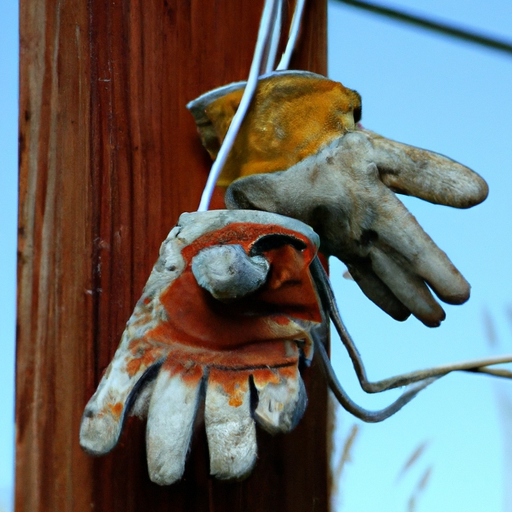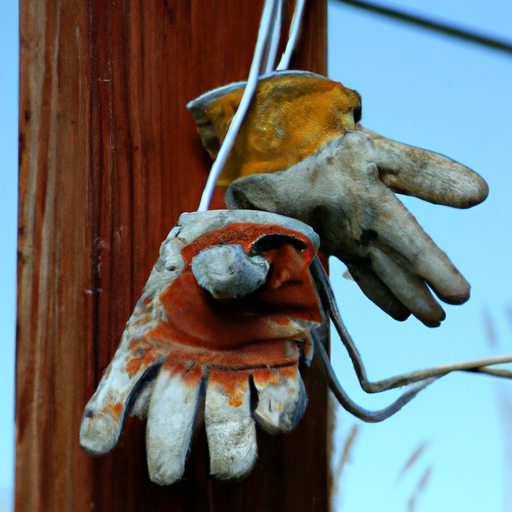Imagine a profession where every day brings a different set of challenges. A job that requires physical prowess, skillful decision-making, and an unwavering commitment to public service. Picture yourself perched high above the ground, fearlessly maneuvering electrical lines and ensuring the uninterrupted flow of power to communities. This is the captivating world of linemen, and in this article, we will embark on a journey to delve into the intriguing realm of job satisfaction among these unsung heroes.
In the hustle and bustle of everyday life, it’s easy to overlook the integral role that linemen play in our society. However, their tireless efforts keep the lights on, connect us to the digital world, and ensure the smooth functioning of our modern lives. But what truly drives these dedicated individuals to wake up every morning, ready to face the uncertainties that come with their profession? Join us as we explore the fascinating factors that contribute to the job satisfaction of linemen, shedding light on the unique challenges they face, the rewarding moments they cherish, and the fulfillment they find in their crucial role in the electric power industry. Get ready to uncover a side of linemen that will leave you inspired and appreciative of their unwavering dedication.
Overview of Lineman Job
Definition and Role of Linemen
Linemen, also known as electrical power line installers and repairers, play a vital role in the power industry. These skilled professionals are responsible for installing, maintaining, and repairing electrical power systems, including overhead and underground power lines. Linemen work on high poles and towers, often at great heights, to ensure the reliable transmission and distribution of electricity to homes, businesses, and industries.
Importance of Linemen in the Power Industry
Without linemen, the power industry would come to a halt. They are the backbone of the electrical infrastructure, ensuring that electricity is consistently available to meet the needs of society. Linemen work diligently to maintain and repair power lines, quickly responding to outages and restoring power during emergencies. Their expertise and dedication are crucial in keeping homes lit, businesses operating, and the economy thriving.
Factors Influencing Job Satisfaction
Work Environment
The work environment is a significant factor in linemen’s job satisfaction. Linemen often perform their duties in challenging conditions, including extreme weather, tight spaces, and at great heights. A positive work environment, characterized by supportive colleagues and supervisors, can greatly enhance job satisfaction.
Salary and Compensation
Fair and competitive compensation is essential to ensuring job satisfaction among linemen. A good salary, overtime pay, and bonuses can contribute to financial security and recognition for their hard work. When linemen feel valued and adequately compensated, their job satisfaction increases.
Job Security
Job security is another crucial factor that influences satisfaction in the lineman profession. Linemen should feel confident in their employment stability, knowing they can rely on a steady income. Factors such as industry demand and union representation play a significant role in job security for linemen.
Safety and Risk
The safety of linemen is of paramount importance. Job satisfaction among linemen increases when safety measures are in place, and risks are properly mitigated. Adequate safety training, high-quality equipment and tools, and protocols for working at heights and in extreme weather conditions are crucial to ensuring their well-being.
Opportunities for Growth and Advancement
Linemen value opportunities for professional growth and advancement. Providing career development programs, promotion paths, additional training, and certifications will contribute to their job satisfaction. Linemen who can see a clear path for progress and the chance to further develop their skills are more likely to feel satisfied in their roles.
Work Environment
Physical Demands of the Job
Working as a lineman is physically demanding and requires strength, agility, and stamina. Linemen often have to climb poles, carry heavy equipment, and work in various weather conditions. While the physical demands can be challenging, linemen take pride in their ability to accomplish tasks that require physical prowess.
Work Schedule and Hours
Linemen often work long and irregular hours, including weekends and holidays. This is due to the need to address power outages and emergencies promptly. While the unconventional work schedule can be a drawback for some, it also offers the benefit of flexibility and the ability to plan personal activities during off-peak hours.
Teamwork and Collaborative Atmosphere
Linemen work in teams, relying on strong collaboration and teamwork to ensure efficient and safe operations. The camaraderie among linemen fosters a supportive atmosphere where colleagues can rely on each other for assistance and advice. The sense of teamwork and unity contributes to job satisfaction.
Relationship with Supervisors and Colleagues
Positive relationships with supervisors and colleagues are crucial to job satisfaction for linemen. Respectful and open communication, constructive feedback, and mentorship opportunities enhance the work environment. When linemen feel valued and supported by their supervisors and colleagues, job satisfaction improves.
Salary and Compensation
Base Salary
Linemen typically earn a competitive base salary that reflects the demands and responsibilities of their profession. The base salary may vary based on factors such as experience, location, and the employer. A fair and adequate base salary is fundamental to job satisfaction among linemen.
Overtime and Bonuses
The nature of the lineman job often requires working overtime and responding to emergencies outside of regular working hours. Overtime pay and bonuses provided for exceptional performance or participation in hazardous operations contribute to the overall compensation package, boosting job satisfaction.
Benefits and Perks
In addition to salary and overtime pay, linemen often receive an attractive benefits package. This may include health insurance, retirement plans, paid time off, and allowances for travel or special equipment. Comprehensive benefits and perks contribute to job satisfaction by providing a sense of security and well-being.
Comparison with Similar Professions
Linemen generally enjoy competitive compensation compared to similar professions. When comparing salaries and benefits with related occupations, such as electricians or construction workers, linemen often find their compensation favorable. This recognition can enhance job satisfaction and attract skilled individuals to the lineman profession.
Job Security
Demand for Linemen
The demand for linemen is projected to remain strong in the future. As the population grows and energy consumption increases, the need for reliable power transmission and distribution will continue to rise. Linemen can find reassurance in job security, knowing their skills will be in demand to maintain and expand the power grid.
Industry Stability and Growth
The power industry is a stable sector that continuously evolves and adapts to technological advancements. As renewable energy sources grow in popularity, linemen with updated skills and knowledge in new technologies will find increased opportunities for job security. A stable and growing industry fosters job satisfaction among linemen.
Union Representation
Many linemen benefit from union representation, which advocates for their rights, safety, and fair compensation. Union membership provides linemen with collective bargaining power, ensuring their voices are heard and their interests are protected. Union representation contributes to job security and enhances overall job satisfaction.
Safety and Risk
Safety Training and Protocols
Linemen undergo comprehensive safety training to ensure their well-being. They are taught the best practices for working at heights, using personal protective equipment, and following safety protocols. Regular safety refreshers further reinforce their knowledge and skills, mitigating risks and enhancing job satisfaction.
Equipment and Tools
Working with high voltage electricity requires specialized equipment and tools. Linemen rely on top-quality gear, insulated gloves, safety harnesses, and tools designed for the job. When provided with reliable and well-maintained equipment, linemen can perform their duties with confidence, contributing to their job satisfaction.
Working at Heights
Linemen often work at great heights, requiring them to scale poles and towers. Height-related risks are mitigated by safety protocols, appropriate gear, and proper training. The importance of safety measures and precautions is emphasized to reduce accidents and injuries, ensuring linemen’s safety and job satisfaction.
Dealing with Extreme Weather Conditions
Linemen frequently work in adverse weather conditions, whether scorching heat, torrential rain, or freezing temperatures. Precautions are taken to minimize risks associated with extreme weather, including additional safety measures and protective clothing. When linemen feel adequately prepared and supported during extreme conditions, their job satisfaction increases.
Opportunities for Growth and Advancement
Career Development Programs
Employers can provide career development programs tailored to linemen. These programs may include workshops, seminars, and on-the-job training to enhance skills and knowledge. Investing in linemen’s professional development shows a commitment to their growth and increases job satisfaction by providing them with opportunities to expand their expertise.
Promotion and Advancement Paths
Establishing clear promotion and advancement paths within the lineman profession is crucial for job satisfaction. Linemen should have a transparent understanding of the criteria and opportunities for career progression. A clear path to advancement allows linemen to set goals, work towards them, and feel recognized for their achievements, fostering job satisfaction.
Additional Training and Certifications
Providing linemen with opportunities for additional training and certifications allows them to broaden their skillset. Advanced certifications, such as Journeyman Lineman or Certified Utility Safety Professional, can open doors to higher-paying positions and increased job satisfaction. Continued professional development keeps linemen engaged and invested in their careers.
Transferring Skills to Other Industries
Linemen possess a unique set of skills that can be transferred to other industries. By acknowledging and promoting the diverse range of skills acquired as a lineman, individuals have the potential to explore different career paths while staying within the power industry. This adaptability and flexibility of skill transferability contribute to job satisfaction.
Job Satisfaction Surveys and Research
Existing Studies on Linemen Job Satisfaction
Several studies have explored job satisfaction among linemen, evaluating factors such as compensation, work environment, and safety. These studies provide valuable insights into the experiences and perspectives of linemen and help identify areas for improvement to enhance overall job satisfaction.
Surveying Linemen’s Perspectives
Conducting surveys specifically targeting linemen can provide a comprehensive understanding of their job satisfaction. Gathering feedback on various factors, such as compensation, work environment, and opportunities for growth, allows employers to address concerns and make informed decisions to improve job satisfaction among linemen.
Identifying Key Job Satisfaction Factors
By analyzing existing research and survey data, it is possible to identify the key factors that influence job satisfaction among linemen. This information can guide organizations in developing strategies to enhance job satisfaction by targeting specific areas of improvement, providing a more fulfilling work experience for linemen.

Challenges and Drawbacks of the Job
Physical and Mental Stress
The lineman profession presents physical and mental challenges. The physically demanding nature of the job, combined with the pressure to respond quickly to outages and emergencies, can lead to stress and fatigue. Coping mechanisms, support systems, and stress management initiatives are necessary to address these challenges and promote job satisfaction.
Work-Life Balance
Due to the nature of their work, linemen often face challenges in maintaining a healthy work-life balance. The irregular work schedule, long hours, and exposure to hazardous conditions can impact personal relationships and leisure time. Encouraging work-life balance initiatives and providing flexibility when possible can greatly enhance job satisfaction among linemen.
Working in Hazardous Conditions
Linemen work in environments where hazards are prevalent, whether it be working at great heights, dealing with high voltage electricity, or facing extreme weather conditions. The potential risks associated with the job can decrease job satisfaction. Employers must prioritize safety measures, provide appropriate training and equipment, and continuously assess and improve safety protocols to minimize hazards and enhance job satisfaction.
Improving Job Satisfaction in the Lineman Profession
Addressing Work Environment Concerns
To enhance job satisfaction, organizations must prioritize creating a positive work environment. This can be achieved by fostering a collaborative atmosphere, encouraging open communication, and recognizing the contributions and accomplishments of linemen. Providing opportunities for team-building activities and training sessions on effective communication and conflict resolution can also contribute to a positive work environment.
Enhancing Compensation and Benefits
Organizations should regularly assess the compensation packages provided to linemen to ensure they remain competitive and fair. Regular salary reviews, opportunities for overtime and bonuses, and comprehensive benefits can significantly impact job satisfaction. As the job market evolves, employers must stay updated on industry standards to attract and retain skilled linemen.
Investing in Training and Development
Offering opportunities for ongoing training and professional development is crucial for job satisfaction among linemen. Employers should invest in programs that enhance skills, provide certifications, and encourage career advancement. The commitment to supporting linemen’s growth and development demonstrates an organization’s dedication to its workforce and enhances job satisfaction.
Promoting Work-Life Balance
Organizations can promote work-life balance by providing flexible scheduling whenever possible, allowing linemen to balance their professional and personal commitments. Encouraging employees to utilize vacation time, providing access to counseling services, and implementing policies that support work-life balance contribute to higher job satisfaction among linemen.
Mitigating Risks and Enhancing Safety Measures
Addressing safety concerns is paramount in improving job satisfaction among linemen. Employers should regularly review and update safety protocols, provide sufficient safety training, and deploy high-quality equipment and tools. Additionally, promoting a culture of safety awareness and continuous improvement creates an environment that ensures linemen’s well-being, boosting job satisfaction.
In conclusion, job satisfaction among linemen is influenced by various factors such as the work environment, compensation, job security, safety, and opportunities for growth. By addressing these factors and implementing strategies to enhance job satisfaction, organizations can create a fulfilling work experience for linemen, resulting in a motivated and dedicated workforce.








